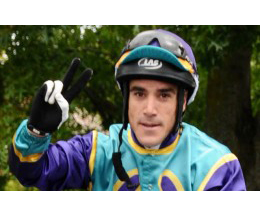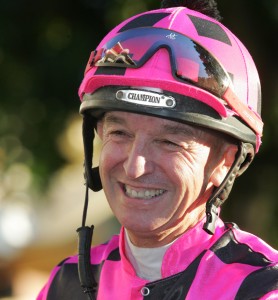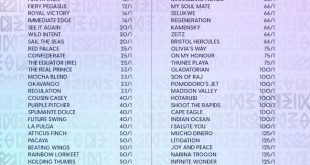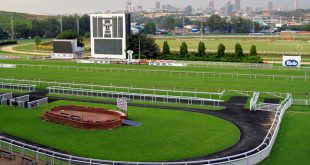Glen Puller set to strike again
PUBLISHED: August 18, 2015
Glen Puller looks set to strike again with Solar Night at Kenilworth tomorrow…
Glen Puller may have been out of luck with Western Storm on Saturday but he had compensation with Harlem Shake in the last and he can strike again with Solar Night in the Midweek Winter Racing Maiden at Kenilworth tomorrow.
Brandon Morgenrood’s mount has finished in the first three on all his three starts and now steps up from 1 200m to a mile. “He should be a better horse going round the turn and I think this trip is what he needs,” says the trainer.
Solar Night, somewhat understandably, opened 15-10 favourite with Betting World today when League Of Legends and Bora Bora were next best at 3-1. Justin Snaith’s colt was considered good enough to go to Durban but League Of Legends may prove a bigger danger. He is rated Solar Night’s equal and, although drawn widest of all, his trainer Paul Reeves does not see this as a problem, saying: “He has plenty of gate speed and he is doing very well at home. I think he is a big runner.”
La Flambee looked a certain future winner when second at 100-1 on debut but she coughed after working on Saturday and Adam Marcus has scratched her from the opening maiden. Variance (who opened big at 10-1) comes from the in-form Vaughan Marshall stable and raced green when showing promise on debut. But Silver Banshee makes more appeal – despite being unfavourably drawn – and she opened favourite at 5-2.
Corne Orffer’s mount finished fourth to Star Academy on debut when Like Janis and Sandton Rocker (both placed on Saturday) were second and third.
“She was working well before her first run and she has done well since,” says Brett Crawford. “With normal improvement she should run a good race.”
Hard Day’s Night caught the eye first time – he ran on well from a long way back and was not given a hard race – and is a Winning Ways horse to follow. That run was nearly three months ago but the Joey Ramsden-trained colt may still win the Place Your Bets Maiden. He is a huge price at 10-1.
Rodney (7-2), who lost ground at the start on debut, seems sure to go close while Union Jack (also 7-2) and Marshall’s 8-1 shot Banderos also have claims. Don’t ignore Salinger (8-1) either despite last time’s expensive Durbanville outing. “He didn’t like Durbanville and we want to see if he can do better here,” says Justin Snaith who cautions: “But this is a very competitive race.”
Donovan Dillon may get off the mark in Cape Town on Ilium in the next. The Snaith filly is the best on merit ratings – although she is meeting the four-year-olds on terms 5kg worse than weight-for-age which nullifies that advantage – and she had Preoccupation a length and a quarter behind when they met over a mile at the beginning of last week.
She is favourite at 5-2 with the consistent but luckless Make The Magnet next best at 3-1 and Preoccupation on 7-2.
By Michael Clower
Picture: Brandon Morgenrood
Juddmonte clash of the titans
PUBLISHED: August 18, 2015
Golden Horn makes a comeback in the Gr 1 Juddmonte International Stakes…
The unbeaten John Gosden-trained Epsom Derby and Coral Eclipse hero Golden Horn (pictured) makes his comeback tomorrow in the Gr 1 Juddmonte International Stakes over one mile, two furlong and 88 yards at York and faces another superstar in the Aiden O’Brien-trained Gleneagles . This almighty clash is the highlight of one of Britain’s biggest racing festivals, the York Ebor Festival, which starts tomorrow and ends on Saturday.
Cape Cross colt Golden Horn is unbeaten in five starts and won the Gr 2 Dante over the Juddmonte trip before his impressive Epsom Derby win, having avoided the 2000 Guineas. He showed a phenomenal turn of foot in the Derby when coming from off the pace to win by 3,5 lengths.
He then showed his versatility by making virtually all in the five-horse-field Eclipse and again winning by 3,5 lengths. The legendary Franke Dettori has ridden him in three of his races, including both of his Gr 1s, and will be back aboard today from a draw of seven in the eight horse field. Dettori still believes Golden Horn is improving.
Gleneagles was beaten on debut but has since won eight races in succession and the last five of them were Gr 1s, two of them in Ireland, two in England (the 2000 Guineas and the St. James Palace Stakes) and one in France.
However, this will be the first time he is going beyond a mile. Gleneagles is by the peerless sire Galileo, whose three Gr 1 wins including the Epsom Derby were all over a mile-and-a-half. However, Gleneagles is out of the Storm Cat mare You’resothrilling, who won a Gr 2 and a Gr 3 over six furlongs. On the other hand she did also go close in a Gr 1 over a mile and wasn’t disgraced in a Gr 1 in France over ten furlongs, finishing six lengths back. On pedigree Gleneagles could therefore have a chance of seeing out the trip. He is usually held up in touch before asserting his authority late.
Gleneagles will be hoping the ground is fast and it is predicted to be so. Golden Horn’s two Gr 1 wins have been on good to firm ground and he won the Dante in good ground.
The Roger Charlton-trained Dubawi colt Time Test faces his first big test, but his trainer believes he could “ruffle a few feathers.” He was an enormously impressive winner of the Gr 3 Tercentenary Stakes over ten furlongs at Royal Ascot in just his fifth career start, so is still an unknown quantity.
Another interesting contender is the Australian raider Criterion, who has won three Gr 1s in Australia from ten to twelve furlongs. However, he was beaten into third in the QE II Cup over ten furlongs at Sha Tin in Hong Kong and was a 3,75 lengths fifth in the Gr 1 Prince Of Wales Stakes over ten furlongs at the Royal Ascot meeting, so has a mountain to climb in this company.
The Grey Gatsby won the Dante last season and was later second in the Juddmonte to the classy Australia. He has 3,5 lengths to find on Golden Horn from the Eclipse, but appears to love York and it would be no surprise to see him in the first three.
O’Brien has also entered Cougar Mountain, who won a Gr 2 over a mile last time out in Ireland, but has 8,75 lengths to find on Golden Horn from the Eclipse. It would be no surprise to see him setting tactical fractions for his stablemate. Gleneagles would likely not want the pace to be too fast. However, this possible plan might be scuppered by the presence of Arabian Queen, the only filly in the race. She finished third in the Gr 1 Nassau Stakes for fillies and mares over ten furlong at Goodwood last time out and this is considerably stronger, but she is a keen running sort and might ensure a good pace.
The only other runner is Dickdoubtwylie and he looks outclassed.
Golden Horn will be attempting to follow in the footsteps of his paternal half-brother Sea The Stars, who followed his Derby win with victories in the Eclipse and the Juddmonte. Sea The Stars had earlier won the 2000 Guineas and after his Juddmonte win he made it six Gr 1 victories on the trot by winning the Irish Champion Stakes and the Prix De L’Arc De Triomphe.
The Arc is probably the most prestigious flat race in the world and Sea the Stars victory in that race, when fighting for his head in the running and then surging through two narrowing gaps from a hopeless position in the straight for an easy two lengths victory, is why some regard him as the equal if not better than the mighty Frankel. Frankel, who easily won the Juddmonte as a four-year-old in his first race beyond a mile, was unbeaten in 14 starts including ten Gr 1s and achieved the highest Timeform ratng in history, but the Arc was missing from his CV.
The Golden Horn and Gleneagles head-to-head has been billed “the clash of the titans” and takes place at 16h40 South African time. It will be shown live on Tellytrack.
By David Thiselton
Princess aimed at Fillies Guineas
PUBLISHED: August 18, 2015
Princess Royal has set her sights on the Avontuur Cape Fillies Guineas…
Princess Royal, second only to Entisaar in the three-year-old filly merit ratings, has the Avontuur Cape Fillies Guineas on December 5 as her target.
Glen Kotzen said: “She is having a break at the moment and then I will prepare her for the Choice Carriers Championship on November 7. After that she goes for the Fillies Guineas.”
The Captain Al filly won first time out at Kenilworth and the East Cape Fillies Nursery at Fairview before finishing a length second to Entisaar in the Allan Robertson. She started favourite for the Golden Slipper on July day but managed only fifth to Chestnuts N Pearls.
At the time Kotzen felt that some of his horses just didn’t kick when asked to quicken but he now takes a different view with this filly, saying: “I don’t think she enjoyed Durban. However she has settled down beautifully after coming home and she has also grown so much.”
Princess Royal is a half-sister to Princess Victoria with whom Kotzen won both the Choice Carriers and the Fillies Guineas in 2011 while the Choice Carriers winner has gone on to take the Kenilworth classic five times in the last ten years.
By Michael Clower
Picture: Glen Kotzen
Awards controversy
PUBLISHED: August 18, 2015
Cape Town jockeys are unhappy about the calculations of the Cape Racing & Breeders’ Awards…
The Cape Town jockeys are unhappy about the way their awards are calculated for the Cape Racing & Breeders’ Awards ceremony and intend to make representations to have this changed.
Karl Neisius said: “For the last two years it has been done on a national statistics basis instead of on winners ridden in the Western Cape as in the past. A similar change has been made to the way the trainers’ award has been calculated.
“So far as I know neither the jockeys nor the trainers were approached to give their opinions and it makes a mockery of the honours boards in the Kenilworth grandstand. We intend writing a letter to request a return to the old system.”
Greg Cheyne won the award this time with 156 winners on the national log but 83 of these were in Port Elizabeth where he topped the log. The jockey who rode the most winners in the Western Cape was Grant van Niekerk with 80.
It was a similar story with the trainers. Justin Snaith took the Cape trainer of the year award as he was the highest-placed Western Cape trainer on the national log but Mike Bass won the most stakes in the Western Cape.
By Michael Clower
Gauteng trainers back on top
PUBLISHED: August 18, 2015
Due to the record-breaking stakes earnings of Sean Tarry, the National Trainers Championships trophy has found its way back to Gauteng…
The National Trainers Championships trophy has found its way back to Gauteng due to the record-breaking stakes earnings that trainer Sean Tarry raked up this past season. The latter’s Highveld colleagues between them also had many moments to savour.
Tarry’s strength lay in his three-year-old crop, seven of whom earned about 50% of his total stakes of R25,924,950.
The filly Tamaanee got the ball rolling by finishing third in the hitherto richest race in South African history, The R3,85 million Emperor’s Palace Ready To Run Stakes. Zambezi River then won the R2 million Lanzerac Ready To Run Stakes, while Trip To Heaven beat older horses to win the R450,000 Stonach Group Gr 2 Merchants. Zambezi River was later a disappointing fifth in the Gr 1 Grand Parade Cape Guineas but bounced back with a short-head second in the R1 million CTS Stakes. At the same meeting Tarry’s filly Carry On Alice finished third in the Gr 1 Betting World Cape Flying Championships.
Tarry’s other Cape Summer Of Champions Season highlights were the third and second place finishes of his veteran Gold Onyx in the Gr 1 L’Ormarin’s Queen’s Plate and Gr 1 J&B Met respectively.
At the end of January Mike de Kock led the national log on R9,919,312.50, Tarry was on R9,717,425.00 and defending champion Justin Snaith was on R8,295,662. However, Tarry’s halcyon Johannesburg Autumn season then put the championship race to bed.
His filly Siren’s Call won the R2,5 million CTS Book 2 Graduates Race and followed up with victories in the Gr 2 R500,000 Wilgerbosdrift Gauteng Fillies Guineas and the Gr 1 R1 million Wilgerbosdrift SA Fillies Classic. She narrowly failed to land the Wilgerbosdrift Triple Tiara when caught late in the R1 million Wilgerbosdrift SA Oaks.
Tarry’s filly Trophy Wife finished runner up in both the CTS Book 2 Graduates Race and the Gauteng Fillies Guineas and also in the Gr 1 R1 million Laurie Jaffee Empress Club Stakes, a race in which Tamaanee finished third.
Meanwhile, the yard’s gelding French Navy won the Gr 1 R2 million SA Classic and later finished third to his stablemate Legal Eagle in the Gr 1 R2 million SA Derby. At the end of April Tarry was clear with earnings of R20,684,650 to De Kock’s R16,253,262.50 and Snaith’s R11,121,712.50.
Tarry was duly crowned Highveld Champion trainer. He had effectively sealed the National Championship by early June after winning the Gr 1 City Of Pietermaritzburg Sprint with Carry On Alice and the Gr 1 Daily News 2000 with French Navy. All in all the yard won five Gr 1s, four Gr 2s, four Gr 3s, three Listed races and five Non-Black Type features.
De Kock was second on the national log with earnings of R19,616,262. He won eight Gr 1s (including the postponed eLan Property Group Gold Cup which officially fell in this season) two Gr 2s, five Gr 3s, three Listed events and two Non-Black Type features.
Geoff Woodruff was seventh on the national log with earnings of R8,519,538. His Triple Crown hero Louis The King’s won the Gr 1 SANSUI Summer Cup and the yard also won a Gr 2, a Gr 3, four Listed races and a Non-Black Type feature.
Alec Laird finished eleventh on the log on earnings of R7,056,775. His filly Smart Call won the Gr 1 Woolavington 2000, while older horse Bezanova won the Gr 2 Peermont Emperor’s Palace Charity Mile and the Non-Black Type KZN Breeders Million Mile, as well as finishing third in the Gr 1 Rising Sun Gold Challenge. The yard also had one other Gr 2 win, one other Non-Black Type win and a Listed win.
Mike Azzie finished 13th on the national log with earnings of R6,625,900. At the postponed Super Saturday meeting his exciting pair Rabada and Abashiri finished first and third respectively in the Gr 1 Premier’s Champion Stakes. The yard also had one Listed and one Non-Black Type victory apiece, while their colt Deputy Jud finished third and second respectively in the Gr 1 SA Classic and Gr 1 SA Derby and their filly Frosted Honey finished second in the Gr 2 SA Fillies Nursery.
Dominic Zaki finished 16th on the national log with earnings of R6,259,275. His colt Arabian Beat won the Gr 1 SA Nursery and then overcame a wide draw to finish just 0,15 lengths back in third in the Gr 1 Durban Golden Horseshoe over 1400m. Zaki also had both Gr 1 third and a Gr 1 second with two-year-old filly Prospect Strike. The yard also won a Gr 3, two Listed races and a Non-Black Type feature.
Weiho Marwing, who officially became a KZN trainer during the season, finished 18th on the national log and won the Gr 1 President’s Champions Challenge with Wylie Hall and he also won a Gr 2, a Gr 3, a Listed race and a Non-Black Type feature.
Johan Janse van Vuuren finished nineteenth on the national log and won the Gr 2 Investec Dingaans with Unparalleled. Janse van Vuuren also won a Gr 3 and two Non-Black Type features.
St. John Gray’s gelding Yer-Maan won both the Gr 1 Castle Tankard and the Gr 2 Ok Grand Challenge before failing to become the first horse to land all three of Zimbabwe’s biggest races when finishing third in the Gr 3 Republic Cup.
Stuart Pettigrew and Tyrone Zackey both had one Gr 2 victory apiece. Corné Spies won three Gr 3s, a Listed race and six Non-Black Type features. Louis Goosen won a Gr 3 and two Listed races. Ormond Ferraris and Staneley Ferreira both won a Gr 3 and a Listed race each.
Barend Botes won a Gr 3, Lucky Houdalakis won a Listed race and a Non-Black Type feature, Roy Magner, Leon Erasmus and David Rahilly each won a Listed race apiece and Paul Matchett won a Non-Black Type feature.
By David Thiselton
















